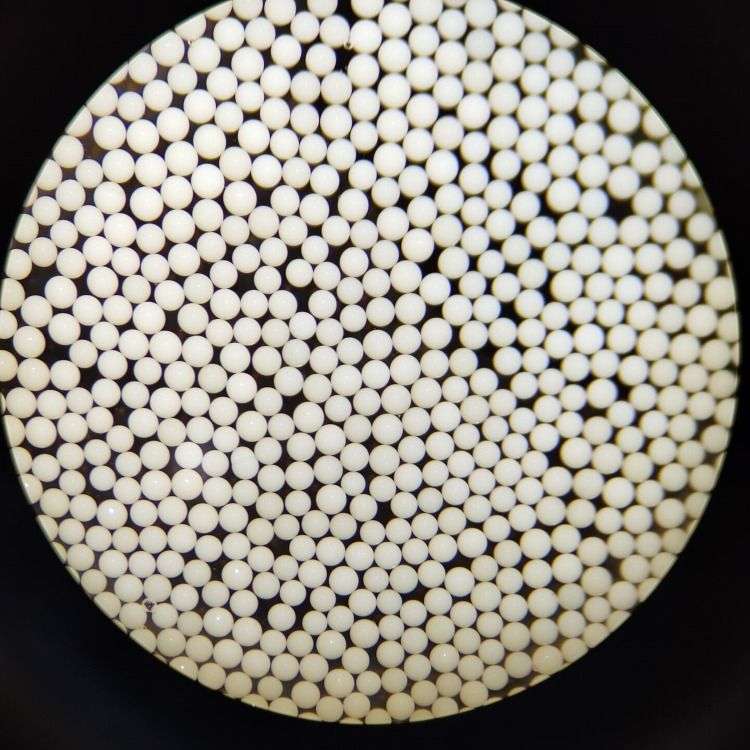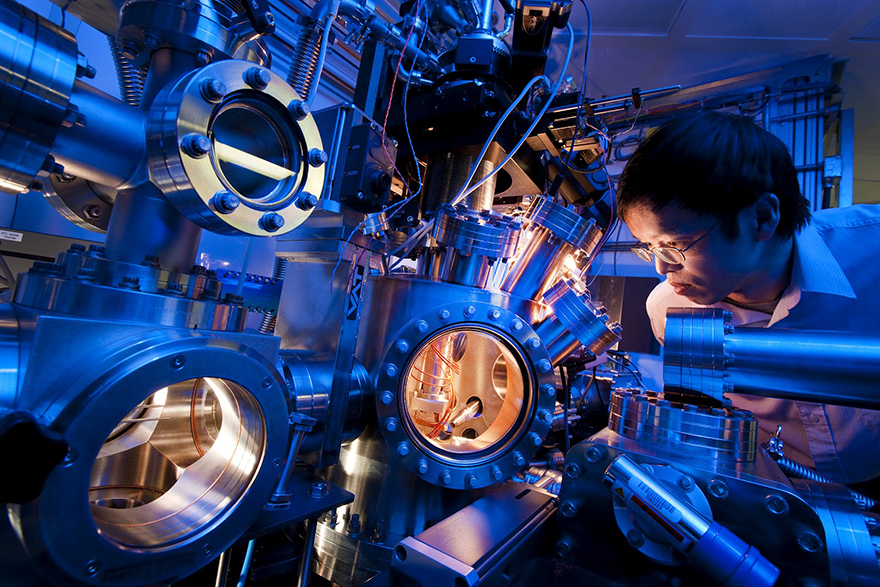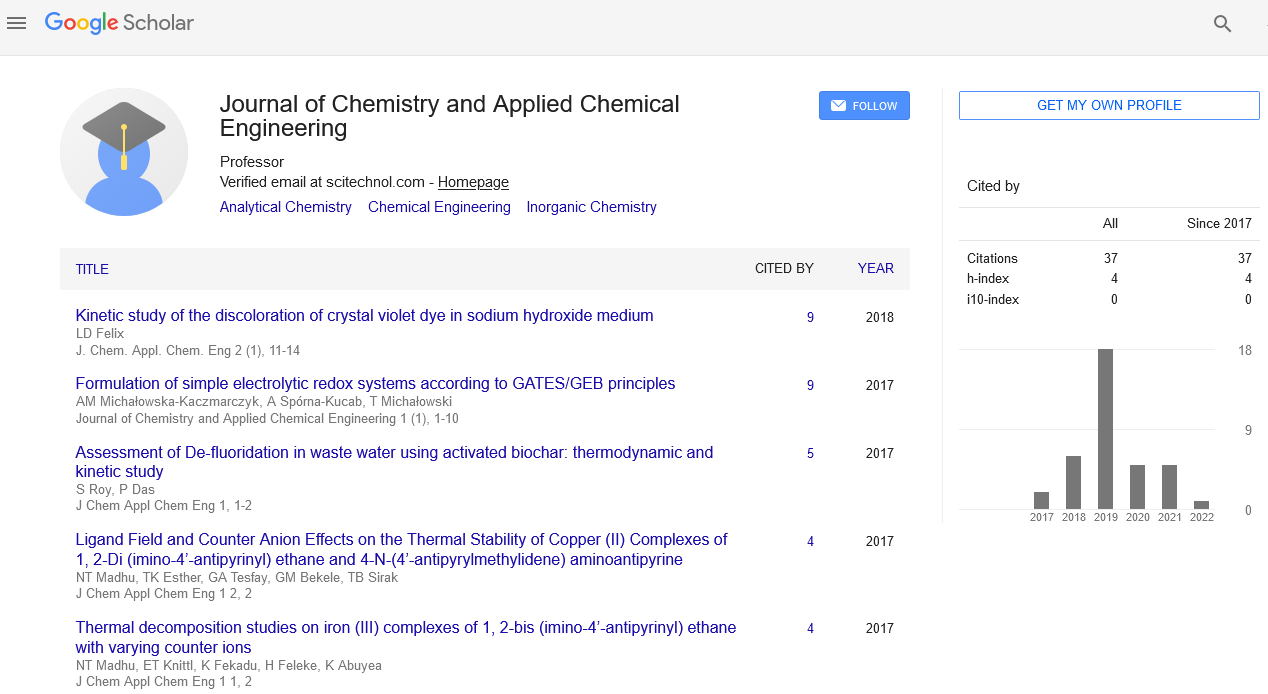About the Journal of Chemistry and Applied Chemical Engineering
Journal of Chemistry and Applied Chemical Engineering is an open access Journal dedicated to publishing high-quality research in all areas of Chemistry and applied chemical engineering.
In addition to reflecting the traditional core branches of Chemistry such as Physical, Organic, and Inorganic Chemistry, the Journal also features a wide range of research in ancillary areas including, but not limited to chemical engineering, radiochemistry, catalysis, enzyme kinetics, natural products chemistry, quantum chemistry, solid-state chemistry, femtochemistry, nanochemistry, pharmacology, electrochemistry, chemical process modeling, ceramics, plastics etc.
Manuscript can be submitted via Online Submission System send as an e-mail attachment to the Editorial Office at manuscript@scitechnol.com
All manuscripts are subjected to a vigorous peer review process, to ensure quality and originality. Review processing is performed by the Editorial Board members of Journal: Chemistry and Applied Chemical Engineering or outside experts; Approval by at least two independent reviewers and the editor is the pre-requisite for acceptance of a manuscript for publication. Authors may submit manuscripts and track their progress through online tracking system, hopefully to publication.
The scope of the Journal includes (but not limited to) studies from the fields of :
- Physical Chemistry
- Organic Chemistry
- Inorganic Chemistry
- Analytical Chemistry
- Chemical Engineering
- Computational Chemistry
- Theoretical Chemistry
- Environmental Chemistry
- Medicinal Chemistry
- Polymer Chemistry
- Nuclear Chemistry
- Petrochemistry
- Material Science
- Biochemical Engineering
In addition to research articles, the Journal also publishes review, case reports, case study, commentary, letter to editor, mini review, opinion, short communication, book review, and editorials of utmost significance.
Physical Chemistry
Physical chemistry blends the science of chemistry and physics together. It deals with the dependence of chemical substances on their structure and physical properties. This helps in understanding the physical changes in a substance during chemical reactions, which is being studied in this branch of chemistry.
Organic Chemistry
Organic Chemistry is a chemistry sub part involving study of structure, properties of compounds containing carbon. It encompasses study of a range of properties including both physical and chemical properties of both hydrocarbons and other associated compounds like oxygen, Hydrogen, Sulfur, Phosphorus and Nitrogen.
Inorganic Chemistry
Inorganic chemistry involves study of behavior of inorganic compounds, which encompass metals, minerals, and organometallic compounds. All compounds which are not carbon hydrogen based come under Inorganic compounds and its study comprises Inorganic chemistry.
Analytical Chemistry
Analytical chemistry is the exploration of acquiring, processing, and imparting data about the composition and structure of matter. It studies and uses instruments and strategies used to isolate, recognize, and measure matter. In practice, division, identification or measurement may establish the whole analysis or be joined with another strategy. Partition isolates analytes. Qualitative examination recognizes analytes, while quantitative investigation decides the numerical amount or concentration.
Chemical Engineering
Chemical engineering is a part of engineering that utilizes standards of science, physics, arithmetic, science, and economics to productively utilize, produce, change, and transport synthetics, materials, and energy. It influences vast areas and disciplines and is tied in with changing crude materials into valuable items, for example, garments, food and drink, and energy. Chemical Engineering manages the structure and maintenance of chemical plants and the improvement of synthetic procedures for changing crude materials or synthetic compounds into significant structures. It consolidates learning of Chemistry and Engineering for the generation of synthetic compounds and related by products.
Computational Chemistry
Computational science is a part of science that utilizes computer simulation to help with taking care of synthetic issues. It utilizes techniques for theoretical science, consolidated into productive computer programs, to ascertain the structures and properties of particles and solids. It is vital on the grounds that, aside from generally ongoing outcomes concerning the hydrogen sub-atomic particle (dihydrogen cation), the quantum many-body issue can't be unraveled diagnostically. While computational outcomes regularly supplement the data obtained by compound trials, it can at times anticipate up to this point unobserved substance phenomena. It is generally utilized in the plan of new medications and materials.
Theoretical Chemistry
Theoretical chemistry is characterized as mathematical depiction of science. It is advancement of calculations and computer projects to anticipate chemical properties; Making and advancing computational methodologies to model molecular interactions and re-activities, from simple molecules to complex assemblies and non-equilibrium states. Theoretical chemistry is the discipline that utilizes quantum mechanics, established mechanics, and statistical mechanics to clarify the structures and elements of compound frameworks and to correspond, comprehend, and anticipate their thermodynamic and dynamic properties.
Environmental Chemistry
Ecological science is the scientific investigation of the chemical and biochemical phenomena that happen in normal places. Ecological science can be characterized as the investigation of the sources, responses, transport, impacts, and destinies of chemical species noticeable all around, soil, and water conditions; and the impact of human action on these. Ecological science is an interdisciplinary science that incorporates air, aquatic and soil science, as well as analytical science. It is identified with ecological and different zones of science. It is not the same as green science, which endeavors to lessen potential contamination at its source.
Medicinal Chemistry
Medicinal chemistry is the science discipline concerned about the plan, advancement and synthesis of pharmaceutical medications. The discipline consolidates skill from science and pharmacology to recognize, create and blend chemical specialists that have a restorative use and to assess the properties of existing medications. Specifically, medicinal chemistry in its most normal work on—concentrating on small natural molecules—includes engineered organic chemistry and parts of common items and computational science in close blend with synthetic science, enzymology and structural science, together going for the disclosure and improvement of new helpful agents.
Polymer Chemistry
Polymer science is the study of the combination, portrayal and properties of polymer particles or macromolecules, which are extensive atoms made out of repeating substance subunits known as monomers. Polymer science is a sub-discipline of science that centers on the chemical combination, structure, substance and physical properties of polymers and macromolecules. The standards and techniques utilized inside polymer science are likewise relevant through a wide scope of other science sub-disciplines like natural science, analytical chemistry, and physical science
Nuclear Chemistry
Nuclear chemistry is the investigation of the chemical and physical properties of components as impacted by changes in the structure of the nuclear core. Present day atomic science, sometimes alluded to as radiochemistry, has turned out to be extremely interdisciplinary in its applications, extending from the investigation of the arrangement of the components known to man to the structure of radioactive medications for analytic medicine.
Petrochemistry
Petrochemistry refers to a part of science that centers around how unrefined petroleum and natural gas are changed into crude materials and other valuable items. It is a territory of science that studies the change of oil and gaseous petrol into helpful items and crude materials for compound items. Petrochemical, in the strictest sense, any of a vast gathering of synthetic substances (as particular from fuels) got from oil and gaseous petrol and utilized for an assortment of commercial purposes.
Material Science
Materials science is an interdisciplinary field concerned about the comprehension and utilization of the properties of matter Materials researchers think about the associations between the hidden structure of a material, its properties, its processing strategies and its execution in applications. It incorporates components of connected material science and chemistry, as well as substance, mechanical, civil and electrical engineering.
Biochemical Engineering
Biochemical Engineering is a part of Chemical Engineering or Biological Engineering. It is a part of building that manages the structure and development of unit forms that include natural life forms or atoms. It is comparative in nature to Chemical Engineering or Biological Engineering. Biochemical building additionally bioprocess designing, is a part of chemical engineering or natural designing that chiefly manages the structure and development of unit forms that include organic living beings or natural particles, for example, bioreactors.
Quantum Chemistry
Quantum chemistry is a part of science whose essential center is the use of quantum mechanics in physical models and examinations of chemical frameworks. It is additionally called atomic quantum mechanics. Quantum science applies quantum mechanics to the hypothetical investigation of compound frameworks. It points, on a basic level, to understand the Schrödinger condition for the framework under investigation; be that as it may, its intricacy for everything except the least complex of atoms or particles requires rearranging suppositions and approximations, making an exchange off between precision and computational expense.
Astrochemistry
Astrochemistry is the investigation of the structure and responses of particles, atoms and particles in space. The theme incorporates the gathering of spectroscopic data from ground-, air-and space-based observatories, lab-based investigations that duplicate the unforgiving situations of space and modeling.
Atmospheric chemistry
Atmospheric chemistry is an investigation of the segments of planetary environments, especially that of the Earth. It is a multidisciplinary approach of research and draws on ecological science, material science, meteorology, computer modeling, oceanography, topography and volcanology and other disciplines. Research is progressively associated with different territories of study, for example, climatology.
Biological Chemistry
Biochemistry or biological chemistry is both a real existence science and a chemical science - it investigates the science of living beings and the sub-atomic basis for the progressions happening in living cells. It utilizes the strategies of chemistry, physics, sub-atomic science and immunology to think about the structure and conduct of the mind boggling particles found in natural material and the manners in which these atoms interface to frame cells, tissues and entire living beings.Biochemistry centers around procedures occurring at a sub-atomic dimension.
Chemical Physics
Chemical physics science is a sub discipline of science and physical science that researches physicochemical marvels utilizing methods from nuclear and atomic physical science and condensed matter physics; it is the part of material science that reviews chemical forms from the perspective of material science.
Material Chemistry
Materials chemistry includes the utilization of science for the plan and blend of materials with intriguing or possibly valuable physical qualities, for example, attractive, optical, basic or catalytic properties.
Fast Editorial Execution and Review Process (FEE-Review Process):
Journal of Chemistry and Applied Chemical Engineering is participating in the Fast Editorial Execution and Review Process (FEE-Review Process) with an additional prepayment of $99 apart from the regular article processing fee. Fast Editorial Execution and Review Process is a special service for the article that enables it to get a faster response in the pre-review stage from the handling editor as well as a review from the reviewer. An author can get a faster response of pre-review maximum in 3 days since submission, and a review process by the reviewer maximum in 5 days, followed by revision/publication in 2 days. If the article gets notified for revision by the handling editor, then it will take another 5 days for external review by the previous reviewer or alternative reviewer.
Acceptance of manuscripts is driven entirely by handling editorial team considerations and independent peer-review, ensuring the highest standards are maintained no matter the route to regular peer-reviewed publication or a fast editorial review process. The handling editor and the article contributor are responsible for adhering to scientific standards. The article FEE-Review process of $99 will not be refunded even if the article is rejected or withdrawn for publication.
The corresponding author or institution/organization is responsible for making the manuscript FEE-Review Process payment. The additional FEE-Review Process payment covers the fast review processing and quick editorial decisions, and regular article publication covers the preparation in various formats for online publication, securing full-text inclusion in a number of permanent archives like HTML, XML, and PDF, and feeding to different indexing agencies.
 Spanish
Spanish  Chinese
Chinese  Russian
Russian  German
German  French
French  Japanese
Japanese  Portuguese
Portuguese  Hindi
Hindi 




